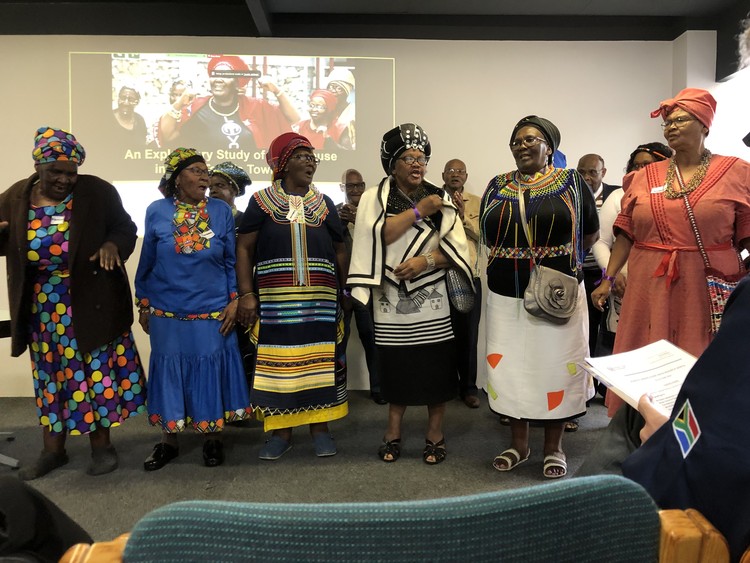Bedsores and maggots: Ikamva Labantu’s shocking findings on elder abuse
Research report released into neglect and abuse of older people in Cape Town’s poor communities
Members of Ikamva Labantu’s Ilizwi Labadala Executive Forum sing at the release of the organisation’s research into elder abuse in Cape Town communities. Photo: Mary-Anne Gontsana
- On Tuesday, Ikamva Labantu released the results of research into the abuse of older people mostly living in Cape Town’s poor communities.
- They found elder abuse was often overlooked in many communities, and that women are significantly more likely to experience abuse.
- Nurses and social workers at the organisation work in about 19 communities and have found many examples where elderly people have been neglected or abused.
- MEC for Social Development Jaco Londt said in the previous financial year, the department helped open over 106 cases of elderly abuse, adding that this had “not even scratched the surface”.
When nurse Nomlindo Mncanywa visted an elderly bedridden woman in Khayelitsha earlier this year she was horrified to find the woman had painful bedsores which already had maggots in them. It wasn’t clear how long she had been left unattended in her home.
“The woman couldn’t tell us where her family members were. My colleagues and I cleaned and bathed her. She had bed sores which were septic. The bed was filled with maggots. We managed to take her to a clinic, but she was sent back untreated with just Panado tablets,” said Mncanywa.
She was speaking at the launch of Ikamva Labantu’s new research report on elder abuse in Cape Town’s townships on Tuesday.
“There are many similar cases we come across where older people are in a state of neglect. Some seniors do not even know what kind of chronic illnesses they have or which medication they are taking,” said Mncanywa.
Ikamva Labantu hosted focus groups with people over the age of 60 from several communities and organisations to forms of abuse such as neglect, physical, sexual, emotional and verbal, financial and systematic abuse.
Researcher Rachael Glaser said there was limited research on elder abuse available. “However, research indicates that older people in informal settlements and areas of high levels of poverty and unemployment, experience a wide variety of abuse.” Women are significantly more likely to experience abuse, said Glaser.
“Places of safety for women exclude older women. Most places of safety only take women up to the age of 59. There’s a crisis of funding as well, older women seldom have places to turn to when suffering abuse,” said Glaser.
Ikamva Labantu’s programme manager for older persons Lulama Sigasana said research had taken place in 19 communities, including Khayelitsha, Gugulethu, Nyanga, Philippi, Langa, Kalkfontein and Dunoon.
“Our research sheds some much-needed light on the hidden challenges faced by older people in the townships and the normalisation of abuse.”
“We found that our senior clubs are a vital form of social protection for our cherished elders, providing them with respite from abuse, empowering them with knowledge of their rights and facilitating healing family interventions,” said Sigasana.
Ikamva Labantu’s Older Persons Programme supports 19 clubs and a home-based care programme in the townships.
MEC for Social Development Jaco Londt, who also attended the event said in the previous financil year the Department of Social Development had helped open over 106 cases of elder abuse. “In the Western Cape, we know that this does not even scratch the surface. That is why we need to create awareness and make sure that it is reported.”
“We work with other provincial departments like the health department and the South African Social Security Agency (SASSA). We also have the older person’s abuse register, the system has been piloted, staff has been trained, but there are some glitches that need to be ironed with national DSD who are the custodians of the system. But we have a manual system where issues can be reported to the DSD,” said Londt.
The Ikamva Labantu researchers also found that several respondents did not think the police had the skills or resources to tackle elder abuse”.
They recommended an increase of public awareness of elder abuse, educating older people about their rights, identifying older bedridden individuals in the community through a mapping process, and improving government responses to elder abuse.
Support independent journalism
Donate using Payfast

© 2024 GroundUp. This article is licensed under a Creative Commons Attribution-NoDerivatives 4.0 International License.
You may republish this article, so long as you credit the authors and GroundUp, and do not change the text. Please include a link back to the original article.
We put an invisible pixel in the article so that we can count traffic to republishers. All analytics tools are solely on our servers. We do not give our logs to any third party. Logs are deleted after two weeks. We do not use any IP address identifying information except to count regional traffic. We are solely interested in counting hits, not tracking users. If you republish, please do not delete the invisible pixel.

